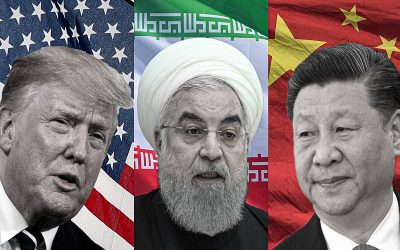The US’ Latest Anti-Iranian Sanctions Will Worsen the Trade War with China

The US’ latest anti-Iranian sanctions won’t change much when it comes to the Islamic Republic’s present economic predicament but will almost certainly provoke a worsening of the so-called “trade war” with China since the real intent seems to be to target the countless companies that are poised to participate in those two countries’ reported $400 billion strategic partnership agreement by replicating the model of “maximum pressure” that’s been experimented against Huawei over the past year.
Unilateral Sanctions
The looming expiration of the UNSC arms embargo on Iran next month prompted the US to unilaterally declare that it regards these and other related sanctions as having been reimposed by the UN despite the global body failing to do so. This factually false pretext serves as the formal justification for the US to threaten so-called “secondary sanctions” against all those who violate its stance towards this issue, thereby turning Iran into an issue of worldwide significance once more. The global strategic context has changed in the nearly two and a half years since the US left the nuclear deal in May 2018, however, which is why the contemporary state of affairs in which this move is being made deserves to be analyzed in order to assess the real aims that the US intends to advance this time around.
Fading Hegemony
After all, the only reason why the US is still pressuring Iran is because its earlier policy of “maximum pressure” failed to influence the targeted government, the same as it failed to convince the international community to support the US’ stance. In this sense, the latest moves must be seen as having been made from a position of weakness, one in which the US is no longer able to impose its fading unipolar hegemony like before. Nevertheless, the US can boast of a few successes such as scaring away India and many other close US partners from retaining their hitherto privileged energy and commercial relations with Iran, which could have crashed the country’s economy and provoked serious socio-political unrest had its people not proven their legendary resilience to such an externally encouraged Hybrid War destabilization.
China’s Opportunity
Iran’s increased “isolation” created a priceless opportunity for China to negotiate a rumored $400 billion comprehensive strategic partnership with the Islamic Republic, one whose details have yet to be verified but which is still widely thought to be significant. As former friends like India continue to stay away from Iran in response to the US’ intensified “maximum pressure” campaign, this will by default increase the importance of Iran’s relations with China, which in turn are poised to make the People’s Republic a serious player in the Mideast if it replicates its Pakistani model of investment to become the host country’s top partner. The US wants to avoid that happening at all costs, which is why the latest sanctions must also be seen in the context of the so-called “trade war” since the threatened “secondary” ones can inflame that economic conflict.
“Trade War”
The rumored scale and scope of China’s reported investment interests in Iran presumes that its most important companies will participate in this gargantuan effort, thereby enabling the US to indirectly worsen the “trade war” in violation of “phase one” of their related agreement by imposing restrictions against them and perhaps even their other foreign partners in the worst-case scenario. In other words, the “maximum pressure” model that it’s been implementing against Huawei over the past year can be expanded to cover countless other companies as well. With this in mind, the latest unilateral sanctions aren’t just about “isolating” Iran, but “isolating” China too, though like practically everything that the Trump Administration has attempted over nearly the past four years, this strategy’s survival is dependent on the outcome of November’s elections.
Concluding Thoughts
Far from being just an intensification of the already failed “maximum pressure” policy against Iran, the US’ latest sanctions against the Islamic Republic are really intended to worsen its “trade war” with China. On the pretext of imposing “secondary sanctions” against any entity that violates its unilateral economic restrictions against the country, America can target in one fell swoop all the Chinese companies that plan to participate in the rumored $400 billion strategic partnership agreement between those two. This will enable it to replicate its “maximum pressure” policy against Huawei on an unprecedented level against countless other targets. Of course, for as ambitious as this unstated strategy is, it might remain nothing more than theoretical if Trump loses the upcoming elections and Biden decides to reverse his predecessor’s policy in this respect.
*
Note to readers: please click the share buttons above or below. Forward this article to your email lists. Crosspost on your blog site, internet forums. etc.
This article was originally published on OneWorld.
Andrew Korybko is an American Moscow-based political analyst specializing in the relationship between the US strategy in Afro-Eurasia, China’s One Belt One Road global vision of New Silk Road connectivity, and Hybrid Warfare. He is a frequent contributor to Global Research.
Featured image is from OneWorld

